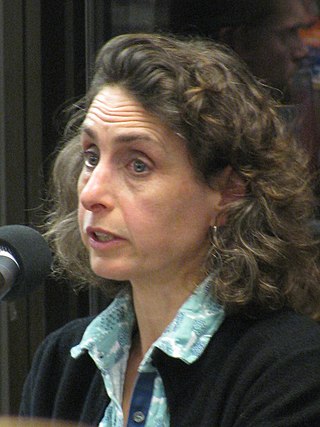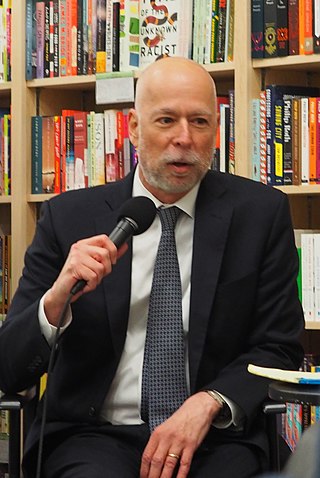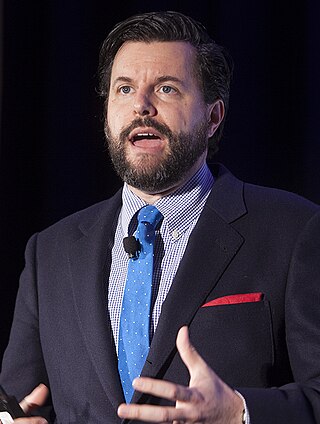
The Pulitzer Prize for Explanatory Reporting has been presented since 1998, for a distinguished example of explanatory reporting that illuminates a significant and complex subject, demonstrating mastery of the subject, lucid writing and clear presentation. From 1985 to 1997, it was known as the Pulitzer Prize for Explanatory Journalism.

Ann Patchett is an American author. She received the 2002 PEN/Faulkner Award and the Orange Prize for Fiction in the same year, for her novel Bel Canto. Patchett's other novels include The Patron Saint of Liars (1992), Taft (1994), The Magician's Assistant (1997), Run (2007), State of Wonder (2011), Commonwealth (2016), The Dutch House (2019), and Tom Lake (2023). The Dutch House was a finalist for the 2020 Pulitzer Prize for Fiction.
Don Van Natta Jr. is an American journalist, writer and broadcaster. He is an investigative reporter for ESPN, since January 2012, and the host and executive producer of “Backstory,” an ESPN docuseries. He previously worked for 16 years as an investigative correspondent at The New York Times, where he was a member of two teams that won Pulitzer Prizes.
The Pulitzer Prizes for 1991 included not only awards given in all categories, but two separate awards were given for International Reporting:

Elizabeth Kolbert is an American journalist, author, and visiting fellow at Williams College.

Adam Liptak is an American journalist, lawyer and instructor in law and journalism. He is the Supreme Court correspondent for The New York Times.
David Streitfeld is a Pulitzer Prize–winning American journalist, best known for his reporting on books and technology. During his tenure as book reporter at The Washington Post, he definitively identified Joe Klein as the "Anonymous" author of the 1996 novel Primary Colors, upon which Klein admitted authorship, despite earlier denials.

David Leonhardt is an American journalist and columnist. Since April 30, 2020, he has written the daily "The Morning" newsletter for The New York Times. He also contributes to the paper's Sunday Review section. His column previously appeared weekly in The New York Times. He previously wrote the paper's daily e-mail newsletter, which bore his own name. As of October 2018, he also co-hosted "The Argument", a weekly opinion podcast with Ross Douthat and Michelle Goldberg.

David Barstow is an American journalist and professor. While a reporter at The New York Times from 1999 to 2019, Barstow was awarded, individually or jointly, four Pulitzer Prizes, becoming the first reporter in the history of the Pulitzers to be awarded this many. In 2019, Barstow joined the faculty of the UC Berkeley Graduate School of Journalism as a professor of investigative journalism.
Lorraine Adams is an American journalist and novelist. As a journalist, she is known as a contributor to the New York Times Book Review, and a former contributor to The Washington Post. As a novelist, she is known for the award-winning Harbor and its follow-up, The Room and the Chair.

Charles Duhigg is an American journalist and non-fiction author. He was a reporter for The New York Times. He currently writes for The New Yorker Magazine and is the author of three books on habits and productivity, titled The Power of Habit: Why We Do What We Do in Life and Business, Smarter Faster Better and Supercommunicators: How to Unlock the Secret Language of Connection. In 2013, Duhigg was the recipient, as part of a team of New York Times reporters, of the Pulitzer Prize for Explanatory Reporting for a series of ten articles on the business practices of Apple and other technology companies.
Eric Nalder is an American investigative journalist based in Seattle, Washington. He has won two Pulitzer Prizes.

The 2011 Pulitzer Prizes were announced on Monday, April 18, 2011. The Los Angeles Times won two prizes, including the highest honor for Public Service. The New York Times also won two awards. No prize was handed out in the Breaking News category. The Wall Street Journal won an award for the first time since 2007. Jennifer Egan's A Visit From the Goon Squad picked up the Fiction prize after already winning the 2010 National Book Critics Circle Award. Photographer Carol Guzy of The Washington Post became the first journalist to win four Pulitzer Prizes.

Kate Zernike is an American journalist who is national correspondent for The New York Times, where she has been since April 2000, covering education, criminal justice, Congress, and national elections, and where she covered Hurricane Katrina. She was previously a reporter at The Boston Globe (1995–2000), where she was responsible for covering education and special projects. She is the author of Boiling Mad: Inside Tea Party America (2010), on the Tea Party movement. Marjorie Kehe of The Christian Science Monitor remarked in 2010 that it was likely that "no other journalist in the United States has devoted as much time to covering the tea party movement".
Usha Lee McFarling is an American science reporter who is an Artist In Residence at the University of Washington Department of Communication. She won a 2007 Pulitzer Prize for Explanatory Reporting. University of Washington Department of Communication.
Sarah Stillman is an American professor, staff writer at The New Yorker magazine, and Pulitzer Prize-winning journalist focusing on immigration policy, the criminal justice system, and the impacts of climate change on workers. Stillman won a National Magazine Award in 2012 for her reporting from Iraq and Afghanistan and again in 2019 for her article in The New Yorker on deportation as a death sentence. She won a 2012 George Polk Award for her reporting on the high-risk use of young people as confidential informants in the war on drugs, and a second Polk Award in 2021 for coverage of migrant workers and climate change. She also won the 2012 Hillman Prize. In 2016, she was named a MacArthur Fellow. She won a 2024 Pulitzer Prize for Explanatory Reporting for her coverage in The New Yorker about troubling injustices in felony murder prosecutions in the U.S.

Kathleen Gallagher is a Wisconsin-based non-profit executive who was awarded the 2011 Pulitzer Prize for Explanatory Reporting. Gallagher wrote with Mark Johnson, a reporter at the Milwaukee Journal Sentinel, a book based on the Pulitzer Prize-winning series called "One in a Billion: The Story of Nic Volker and the Dawn of Genomic Medicine." Gallagher is now Executive Director of 5 Lakes Institute, a non-profit that promotes technology and innovation. She is also Executive in Residence for Investment Communications at the University of Wisconsin-Milwaukee.

Susanne Craig is a Canadian investigative journalist who works at The New York Times. She was the reporter to whom Donald Trump's 1995 tax returns were anonymously mailed during the 2016 presidential election. In 2018, Craig was an author of The New York Times investigation into Donald Trump's wealth that found the president inherited hundreds of millions of dollars from his father, some through fraudulent tax schemes. She won the Pulitzer Prize for Explanatory Reporting in 2019 for this coverage.
Hiroko Tabuchi is an American climate journalist who has reported from Japan and the United States, and is known for her coverage of the Fukushima Daiichi nuclear disaster in 2011 and its aftermath. She has worked for The New York Times since 2008, and previously written for The Wall Street Journal and the Tokyo bureau of the Associated Press. She was the member of a team of reporters that won a Pulitzer Prize in 2013 and a team that was finalist in 2011.











